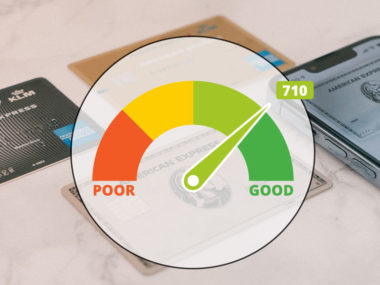If you’ve struggled with debt in the past and are trying to improve your credit report, you may find that the reporting agencies can be very unforgiving. Derogatory marks on your credit report can stay there for between 7-10 years, which can make getting back on your feet, even when you’re taking all the right steps, that much more difficult.
Table of Contents
What Are Derogatory Marks?
A derogatory mark is an event, usually involving non-payment, which credit reporting agencies view as “high risk.” When lenders evaluate you, one of their main concerns is how likely you are to pay back what you borrow. So incidents of late payment, non-payment, accounts in bad standing, and more extreme events (such as bankruptcy), leave marks on your credit score that are difficult to shake off.
Derogatory marks include:
- Past due credit payments: Failing to make the minimum payment of a credit account on time creates a derogatory mark on a credit report. One missed payment on an account may not have a huge impact on your credit, but more than one in a row, or missed payments on several different accounts, add up quickly.
- Past due loan payments: These include auto loans, mortgages, student loans, and other non-revolving accounts. Failing to make the minimum payments on time will lead to derogatory marks.
- Accounts in collections: If you fail to pay an account several periods in a row, the lender will often write off the account as a loss for taxes, and sell it to a collections agency. At this point you have failed to pay off the debt, and once it’s been sold there is little recourse for regaining good account standing with the lender.
- Repossession: If you took out loans against physical property as collateral, then the lender may legally repossess that property if you fail to make payments on the debt.
- Foreclosure: If you fall very far behind on mortgage payments, the bank that issued your mortgage may attempt to recover the debt by taking possession of the home and selling it to someone else, often at a much lower price.
- Debt settlements: Some lenders will negotiate debt settlements for less than the entire amount rather than send the debt to collections. While this is often preferable to collections, it still leaves a mark on your credit score.
- Bankruptcy: Bankruptcy is a legal process through which individuals and businesses can gain relief from unmanageable debt. It comes with a number of legal and financial drawbacks, including a long term derogatory mark on your credit report that substantially discourages lenders from issuing you any new credit accounts.
- Civil judgement against you: If you are taken to civil court and lose, requiring you to pay for debts or damages, this will leave a derogatory mark.
- Tax lien: If you don’t pay your taxes, the government will place a claim on property that you own in order to recover the amount you owe. Among other very serious consequences, this can leave a potentially permanent mark on your credit report.
Derogatory Marks on Your Credit Report
Derogatory marks find their way onto your credit report in two ways. A creditor may report you directly to reporting agencies when you miss payments or enter collections. This can lead to errors, especially if a situation occurs where the account holder misplaces a payment and incorrectly reports you as late.
The second way that marks can show up is through public record. Reporting agencies regularly check public records, and information about civil suits, tax liens, and bankruptcies show up on your report that way.
Lenders are required to give you reasoning if they refuse to issue you a credit account, however, the only sure way to check for derogatory marks on your credit score is to personally review your credit report from all three reporting agencies; Equifax, TransUnion, and Experian. Luckily, it’s getting easier to find services which will do this at no cost. Sometimes, banking institutions and credit lenders with whom you have accounts will give you access to these reports as part of your account.
The credit reports from each agency will be slightly different, and there’s a lot of information to process, but you can track down derogatory marks by reading your credit report. Delinquent, late, or closed in bad standing accounts may be listed separately, or notes may be added to each account individually about its status. Check each account noted, and you’ll be able to read whether it comes with a derogatory mark. The report should include past due amounts and account status, as well as any notes that the lender has added.
Credit reports should also have a public records section, where derogatory marks from civil judgements, court records, liens, and bankruptcies will appear.
How Long Do Derogatory Marks Stay on Your Credit Report?
The standard length of time is seven years. Most derogatory marks stay on your report for that seven year period.
One major difference is bankruptcy. Depending on the type of bankruptcy you file, the period ranges from 7-10 years.
Chapter 7 bankruptcy normally involves the liquidation of major physical assets in order to repay as many creditors as possible. This type of bankruptcy remains on your credit report for 10 years.
Chapter 14 bankruptcy usually doesn’t involve asset liquidation. It is usually only available to people with a demonstrable stable income, and involves negotiated agreements to pay creditors in certain periods of time. This filing remains on your report for seven years.
For most derogatory marks, the credit agencies are required to remove them after the seven, or 10 year period. Some, however, may be renewed if you have still failed to pay the debt you owe. Tax liens, for example, can stay on your report indefinitely if you don’t settle the debt, and unpaid civil judgements can remain on your credit report after the standard period.
How to Remove Derogatory Marks From Your Credit Report
There’s good news and bad news here.
The good news is that, as stated above, most derogatory marks will be automatically removed at the end of seven (or 10) years. As time goes on, they may also have less pronounced effects on your credit if you maintain good credit behavior.
The bad news is that as long as they are legitimate, there really isn’t a way for you to remove them other than good behavior and time.
Illegitimate or mistaken derogatory marks, however, can and should be removed. Errors on your credit report can be more common than you might think, so it’s a good idea to check for them. If you do find errors on your credit report, contact both the credit bureau and the business or institution that is the source of the error. You can submit a dispute, along with documentation to prove the error. If your dispute is successful, the error will be removed from your report within 30 days across all three credit bureaus.
If you have derogatory marks on your credit report that are genuine, the only way to counter them is to maintain a history of good credit behavior. You can do this a number of ways, but the basics are best: pay your bills on time, and keep your credit utilization ratio low.
Another way to improve your credit if you find yourself denied for cards and loans is to talk to your bank about a secured credit card. A secured credit card is generally easier than others to apply for, because you give the bank the amount on the card, then they hold it in a closed account. Effectively, you are borrowing against your own money, which represents very little risk to the bank and allows you to start building a healthy credit history.





